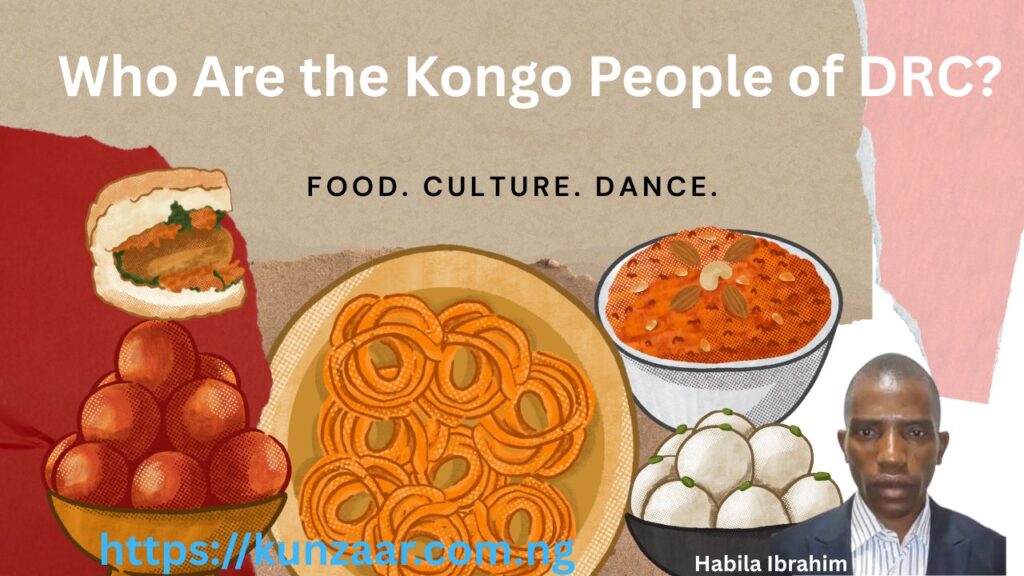Introduction
The Kongo people of DRC are a Bantu ethnic group primarily found in the western part of the Democratic Republic of the Congo, as well as in Angola and the Republic of the Congo. They are one of the most culturally significant groups in Central Africa, known for their ancient kingdom, vibrant traditions, and deep-rooted spiritual beliefs. This article discovers their history, origin, lifestyle, and many more.
History of the Kongo People
The Kongo people’s history dates back to the establishment of the Kingdom of Kongo around the 14th century. This powerful centralized state extended across parts of modern-day DRC, Angola, and the Republic of Congo. It became a major political and commercial force in Central Africa, engaging in trade with Portuguese explorers as early as the 15th century. The kingdom thrived for many centuries before gradually losing their power due to colonial invasions and internal conflicts.
Also Read: The Sayawa (Zaar) Tribe History
Origin and Language
The Kongo people belong to the larger Bantu ethnolinguistic group and speak Kikongo, a Bantu language. Their origin is traced to the Bantu migrations from West and Central Africa thousands of years ago. As they settled along the Congo River and Atlantic coast, they developed complex societies, political systems, and spiritual traditions.
Traditional Kongo Food
Kongo food is based on locally sourced ingredients such as cassava, plantains, maize, and fish.
Key dishes of Kongo people include:
- Fufu – a starchy dough made from cassava or maize flour
- Moambe Chicken – a chicken stew made with palm butter and spices
- Pondu – cassava leaves stew cooked with spices and palm oil
- Grilled or dried fish – often served with spicy sauces and vegetables
These meals are typically shared communally, reflecting the Kongo people’s emphasis on unity and community.
Religion and Beliefs
Traditionally, the Kongo people practiced Bukongo, a spiritual belief system centered on ancestor worship, the spirit world, and the sacredness of nature. They believed in a supreme deity called Nzambi Mpungu, and spiritual leaders (nganga) played a central role in healing and rituals.
With the arrival of the Portuguese, Christianity—especially Roman Catholicism—was introduced in the 15th century. Today, many Kongo people practice Christianity, often blended with traditional beliefs in syncretic forms of worship.
You Can Also Read: Understanding BODMAS-The Secret of Solving Math Problems
Festivals and Celebrations
Kongo festivals reflect both their traditional beliefs and Christian influences. Some of the most notable celebrations among the Kongo people include:
- Nzila Kongo Festival – a celebration of Kongo culture, history, and unity through music, dance, and oral storytelling.
- Christian festivals such as Christmas and Easter are widely observed, often with Kongo cultural elements like traditional drumming and choral music.
- Dances, songs, masks, and symbolic attire are central features of Kongo festivities.
Culture and Daily Life
Kongo people culture is rich in art, music, storytelling, and community rituals. Carving, weaving, and pottery are important traditional crafts. Masks and wooden statues often represent ancestors or spirits and are used in ceremonies and rites of passage. The social structure is traditionally based on clans and lineages, with a strong emphasis on the extended family. Respect for elders, communal living, and collective responsibility are central values.
Countries Where the Kongo People Are Found
The Kongo people are primarily located in:
- Democratic Republic of the Congo (DRC) – particularly in Bas-Congo (Kongo-Central) Province
- Angola – especially in the northern provinces like Zaire and Uíge
- Republic of the Congo – along the southwestern regions
Due to migration and diaspora, Kongo communities can also be found in neighboring African countries and abroad.
Marriage Customs of the Kongo People
Marriage among the Kongo people is both a family and community affair. Traditional marriage includes:
Bride price (Lobola) – offered by the groom’s family as a symbol of respect and union.
Negotiation between families – elders play a key role in arranging and blessing the union.
Ceremonial rites – such as symbolic washing of hands, sharing of kola nuts, and pouring libations to ancestors.
Christian weddings – often follow the traditional ceremony for couples who are Christian.
Marriage is viewed as sacred and a bond not only between individuals but between families and lineages. For those practicing Christianity, wedding are completed in the church for prayers by the Pastor.
Conclusion
The Kongo people of DRC hold a prominent place in African history and culture. From their ancient kingdom to their modern-day communities, they exemplify resilience, creativity, and spiritual depth. Understanding their traditions in food, religion, festivals, and marriage offers valuable insights into one of Africa’s most influential ethnic groups.
Action
How do you stay connected to your cultural identity? You can share your story using #MyCulturalCode and also comment below so as to keep our culture heritage alive! Let built ties through cultures. Also Visit our YouTube Channel: KunzaarChannelsTV through @kunzaarchannelstv to watch the best of cultural heritage.

